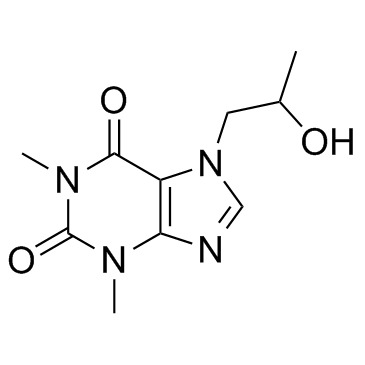Proxyphylline

Proxyphylline structure
|
Common Name | Proxyphylline | ||
|---|---|---|---|---|
| CAS Number | 603-00-9 | Molecular Weight | 238.24300 | |
| Density | 1.46 g/cm3 | Boiling Point | 487.2ºC | |
| Molecular Formula | C10H14N4O3 | Melting Point | 134-136ºC | |
| MSDS | N/A | Flash Point | 248.5ºC | |
| Symbol |

GHS07 |
Signal Word | Warning | |
|
Endocrine regulation of airway contractility is overlooked.
J. Endocrinol. 222(2) , R61-73, (2014) Asthma is a prevalent respiratory disorder triggered by a variety of inhaled environmental factors, such as allergens, viruses, and pollutants. Asthma is characterized by an elevated activation of the smooth muscle surrounding the airways, as well as a propen... |
|
|
High-performance liquid chromatographic determination of (R)-and (S)-proxyphylline in human plasma.
J. Chromatogr. A. 491(2) , 355-66, (1989) A reversed-phase high-performance liquid chromatographic assay has been developed for determination of (R)-(--)-and (S)-(+)-proxyphylline in human plasma. The procedure is based on liquid-solid extraction of proxyphylline from plasma followed by derivatizatio... |
|
|
Acute intoxication with theophylline, proxyphylline and diprophylline in a 3-month-old infant after rectal application: pharmacokinetic data under hemoperfusion.
Acta Paediatr. Scand. 79(1) , 112-4, (1990)
|
|
|
Rheology of polyol behenates and drug release from matrix monolithic capsules.
Int. J. Pharm. 182(2) , 145-54, (1999) Three polyol behenates with similar melting points (MP) and different hydrophilic-lipophilic balances (HLB) were studied (MP/HLB: 70/02, 63/05 and 57/13). After melting at MP+30 degrees C, the rheological behaviour of behenates was determined by adjustment of... |
|
|
Properties controlling the diffusion and release of water-soluble solutes from poly(ethylene oxide) hydrogels. 2. Dispersion in an initially dry slab.
J. Biomater. Sci. Polym. Ed. 5(1-2) , 111-30, (1993) The mechanisms which control the release of dispersed water-soluble drugs from an initially dry hydrogel are complex. The release profile derives from a combination of several contributing factors which may change with time at different rates. It has been pos... |
|
|
Properties controlling the diffusion and release of water-soluble solutes from poly(ethylene oxide) hydrogels. 1. Polymer composition.
J. Biomater. Sci. Polym. Ed. 4(3) , 305-22, (1993) This study examines the state of water-association with poly(ethylene oxide), as evidenced by diffusivity, in a series of crosslinked polyurethanes made from poly(ethylene glycols) of a range of molecular weights. As a subsidiary underpinning exercise the cor... |
|
|
Properties controlling the diffusion and release of water-soluble solutes from poly(ethylene oxide) hydrogels. 4. Extended constant rate release from partly-coated spheres.
J. Biomater. Sci. Polym. Ed. 7(11) , 953-63, (1996) Spheres of poly(ethylene oxide) xerogel from 4-17 mm diameter were impregnated with the drug, proxyphylline, or the herbicide, 2,4-DNa and then partly coated with a water-impermeable elastomer. When placed in water the active additive was released over period... |
|
|
Properties controlling the diffusion and release of water-soluble solutes from poly(ethylene oxide) hydrogels: 3. Device geometry.
J. Biomater. Sci. Polym. Ed. 7(11) , 937-51, (1996) The diffusive release from hydrogels can be determined by both composition and geometry. This paper presents a theoretical and experimental comparison of the release characteristics of proxyphylline in water-swollen slabs, spheres, and cylinders of a urethane... |
|
|
Synthesis, pharmacological activity and nitric oxide generation by nitrate derivatives of theophylline.
J. Pharm. Pharmacol. 60(5) , 637-45, (2008) Nitrates of theophylline derivatives - potential nitric oxide (NO) donors - were synthesized by esterification of 7-hydroxyalkyl theophylline derivatives with fuming nitric acid. The nitrates obtained were tested in-vitro in reactions with sulfydryl compounds... |
|
|
Dissolution assay of theophylline, diprophylline and proxyphylline from a sustained release dosage form by high performance thin layer chromatography.
Biomed. Chromatogr. 6(3) , 141-2, (1992) The content and dissolution rate of theophylline, diprophylline and proxyphylline from a sustained release formulation were determined by UV in situ densitometry. After separation the chromatographic zones corresponding to the spots of theophylline, diprophyl... |